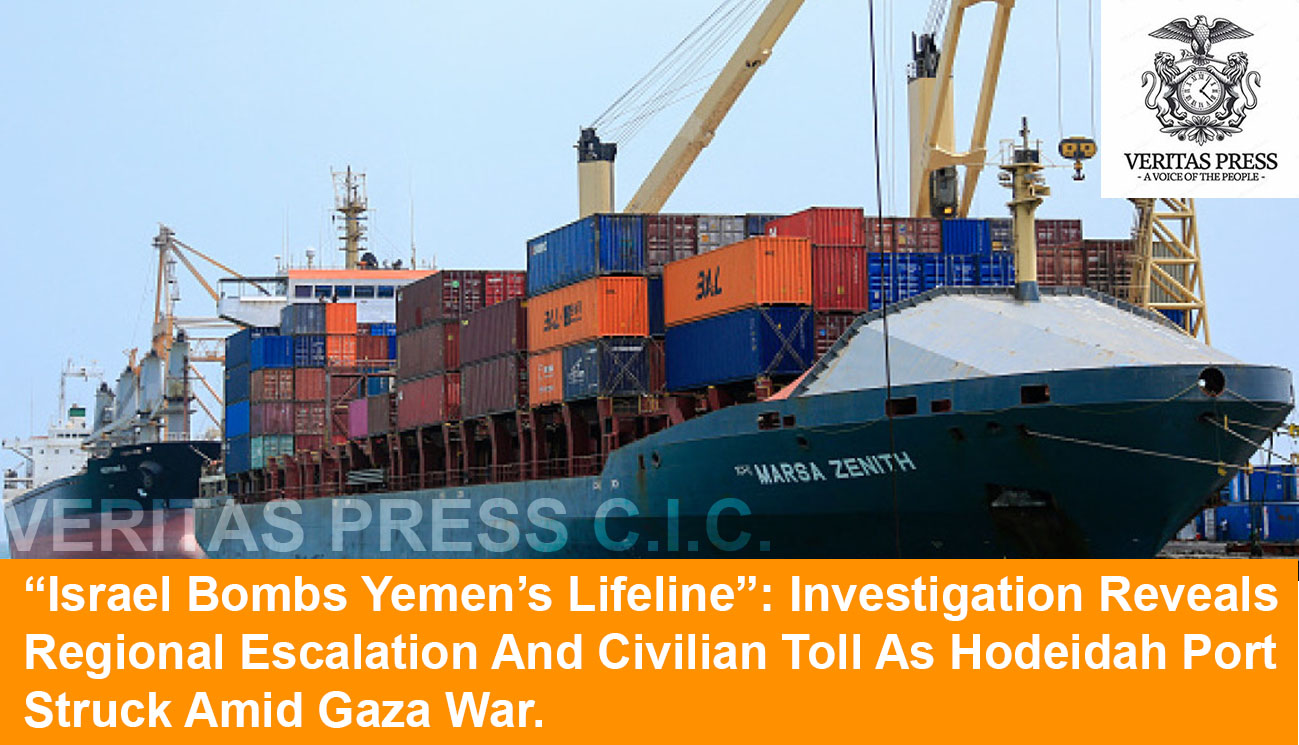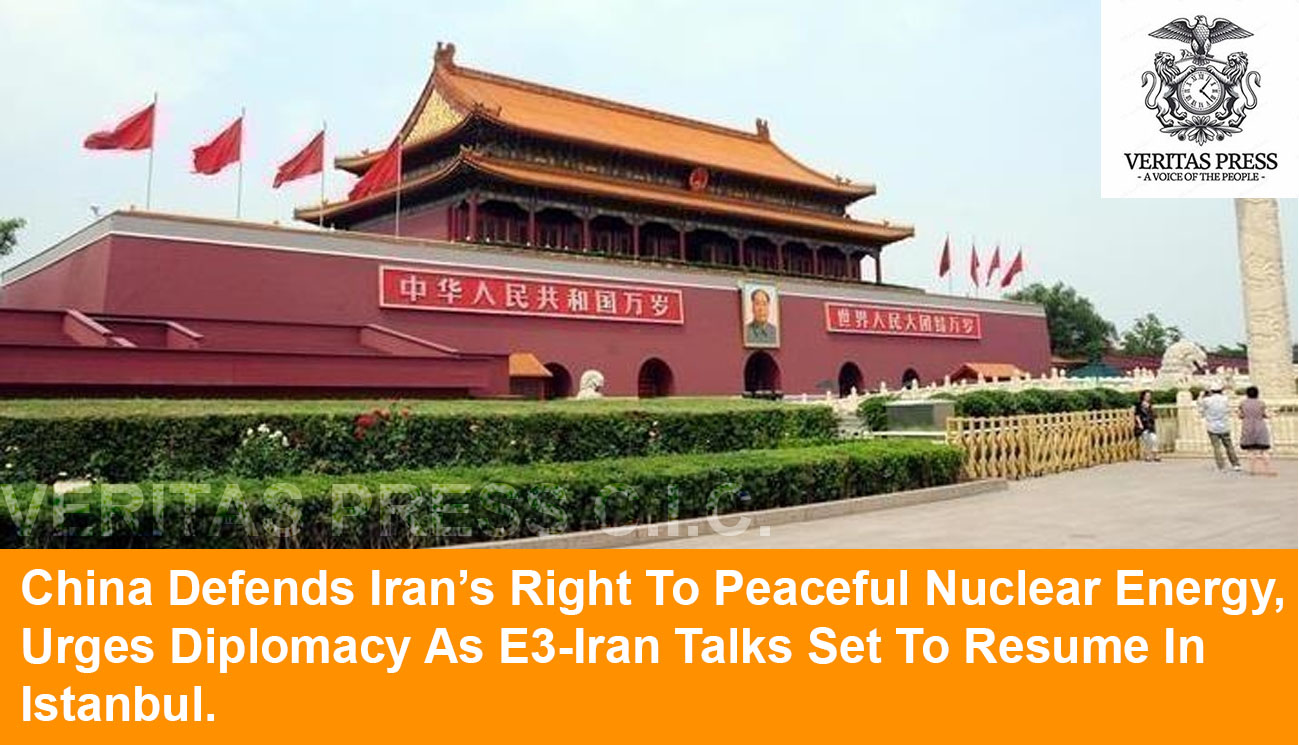Press Release: Veritas Press C.I.C.
Author: Kamran Faqir
Article Date Published: 21 July 2025 at 16:29 GMT
Category: Middle East | Yemen | Gaza Flotilla Launch
Source(s): Veritas Press C.I.C. | Multi News Agencies
HODEIDAH, YEMEN / TEL AVIV, ISRAEL — In a dramatic expansion of its military campaign, Israel has bombed Yemen’s Houthi-controlled port of Hodeidah, a vital lifeline for tens of millions of Yemenis, claiming it was being used as a military base by Iran-backed rebels. But local witnesses, humanitarian agencies, and analysts paint a very different picture: one of collective punishment, regional destabilisation, and reckless disregard for civilian infrastructure.
This marks the second known direct Israeli strike on Yemen since the start of its war on Gaza in October 2023, a conflict now in its 21st month that has killed over 100,000 Palestinians, displaced millions, and is increasingly drawing in actors across the region, from Lebanon to the Red Sea.
Civilians And Aid Workers Decry Port Destruction:
Eyewitnesses on the ground in Hodeidah described scenes of panic as Israeli warplanes struck key infrastructure, including port facilities used to receive humanitarian aid.
“The airstrike hit the main dock, again. It had only recently been repaired. Fishermen, dock workers, and aid trucks were scattered,” said Hussein Al-Maswari, a 42-year-old longshoreman who witnessed the blasts. “They’re punishing Yemen for standing with Palestine. But it’s the people who suffer, not the fighters.”
A security official from the Houthi administration told AFP that “the bombing destroyed the port’s dock, which had been rebuilt following previous strikes.” Satellite images reviewed by independent analysts confirm damage to fuel storage and cargo-handling infrastructure.
The Norwegian Refugee Council condemned the attack, warning it will severely disrupt aid flows to northern Yemen, home to 70% of the population and where 80% of people rely on food and fuel imports through Hodeidah.
“This strike will choke off the delivery of life-saving aid in a country already suffering from one of the world’s worst humanitarian crises,” said Ahlam Al-Nasseri, Yemen coordinator for the NRC. “Targeting a civilian port is a violation of international humanitarian law unless Israel can prove it was a legitimate military target and even then, proportionality must be observed.”
Israeli Justification: ‘Terror Infrastructure’.
Israel claims the port was being used to smuggle Iranian weapons and conduct naval attacks. In a social media post, IDF spokesperson Col. Avichay Adraee called the Houthis the “terrorist Houthi regime” and stated the strikes destroyed “engineering vehicles, fuel containers, and naval vessels used for attacks on Israeli and global maritime trade.”
Israeli Defence Minister Israel Katz took the rhetoric further:
“As I have made clear, Yemen’s law is Tehran’s law. The Houthis will pay a heavy price for firing missiles at Israel. We will continue to act in all places to defend the state.”
But regional observers say Israel is waging an illegal war across borders.
“Israel is effectively expanding its campaign of bombardment from Gaza to Lebanon, Syria, Iraq, and now Yemen. All under the guise of self-defence, but often without solid evidence or proportionality,” said Dr. Rania Masri, a Lebanese academic and anti-war activist. “This is strategic regional escalation designed to deter solidarity with Palestinians.”
Questionable Legality And Civilian Targeting:
The International Committee of the Red Cross (ICRC) reiterated that attacks on civilian ports must follow the principle of distinction. “Even if a dual-use facility is being targeted, indiscriminate damage to humanitarian infrastructure may constitute a war crime,” a Geneva-based legal officer told The New Arab on condition of anonymity.
Analysts argue the strike fits a broader pattern of using civilian infrastructure as leverage, a tactic Israel has been widely accused of employing in Gaza.
“Israel has consistently used starvation and infrastructure destruction as tools of war, from Gaza to southern Lebanon,” said Dr. Anas Shadid, a Middle East conflict expert at SOAS, University of London. “Hodeidah is a red line; it’s not just a military outpost. It’s the only artery left for northern Yemen’s food and fuel.”
Local Fallout And Fear Of Further Attacks:
In the immediate aftermath of the strikes, Al Masirah TV, a Houthi-run channel, confirmed multiple attacks on Hodeidah but did not disclose casualties. Medical workers in the city reported treating at least nine civilians for injuries sustained in the bombing and related shrapnel.
“We have children with head wounds, burns, and broken bones,” said Dr. Reem Al-Sabri, a trauma surgeon at Hodeidah’s Al-Thawra Hospital. “The hospital itself has no diesel for generators. And now the port is on fire again. This will cost lives.”
Locals fear this is just the beginning.
“The Israelis will keep bombing if the West does nothing. We’re already starving,” said Ahmed Qasim, a displaced father of five from Hajjah province. “Are we being punished for showing solidarity with Gaza?”
Geopolitical Risks: Israel Playing With Fire.
Israel’s attacks come amid wider regional instability. The Houthis have responded to the Gaza war by launching drones and missiles at Israeli targets and disrupting Red Sea trade, claiming solidarity with Palestinians. But critics argue Israel’s direct strikes on Yemen mark an escalation with potential to spiral into broader war.
“The Gaza conflict is metastasising,” said Elena Qassim, a former UN regional advisor. “Striking Hodeidah isn’t a tactical operation; it’s an act with strategic consequences. Iran, the Houthis, Hezbollah, all eyes are on how far Israel will go, and what red lines will be crossed.”
U.S. officials have yet to comment on the latest Israeli strike, though Washington has supported previous joint operations against the Houthis. Human rights organisations are calling for an urgent investigation.
“Israel’s impunity is emboldened by silence and complicity from its Western allies,” said Kenneth Roth, former director of Human Rights Watch. “If the world doesn’t push back against extra-territorial bombings and civilian infrastructure destruction, we are greenlighting the normalisation of lawless war.”
Conclusion: A Calculated Escalation Disguised As Defence.
The Israeli airstrikes on Yemen’s Hodeidah port represent far more than a tactical military operation; they are a calculated act of regional escalation under the pretext of self-defence. In targeting the main humanitarian lifeline for tens of millions of Yemenis, Israel has once again blurred, if not erased, the line between military necessity and collective punishment.
Despite Israeli claims of striking “terror infrastructure,” evidence gathered from satellite imagery, eyewitnesses, local officials, and humanitarian organisations paints a damning picture: essential civilian infrastructure was deliberately targeted, crippling a port critical for food, fuel, and medicine. The alleged military value of the port facilities remains unproven, while the civilian cost is immediate and undeniable.
This strike fits a broader Israeli doctrine increasingly on display in Gaza, Lebanon, and now Yemen, one that normalises extraterritorial violence and treats any perceived supporter of Palestinian resistance as a legitimate target, regardless of borders, sovereignty, or civilian impact. With the U.S. and other allies offering tacit approval or calculated silence, Israel continues to act with impunity, expanding the battlefield to punish not only armed adversaries, but the populations that support them, by necessity, proximity, or ideology.
The international community’s inaction in the face of mounting war crimes, from Gaza’s starvation to Yemen’s port bombings, signals a dangerous precedent: that a nuclear-armed state, under the justification of “fighting terror,” can strike anywhere, anytime, with no accountability. Hodeidah’s destruction is not just a warning to the Houthis; it is a message to the entire region that humanitarian infrastructure, international law, and civilian lives are expendable in the pursuit of military supremacy, regional land control, fiscal interests and deterrence.
If the world fails to investigate and hold Israel accountable for these cross-border bombings, it will not only embolden further regional destabilisation, it will institutionalise a model of war without limits, rules, or red lines. And as ever, it is the civilians, already crushed by famine, siege, and airstrikes, who will pay the price for global cowardice.
Advertisements
Tags:






























Leave a Reply